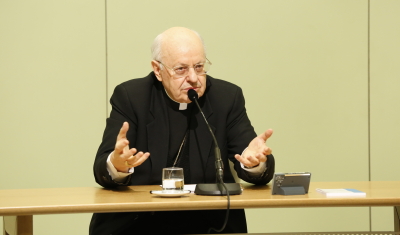
Feb 25, 2016 | Non categorizzato
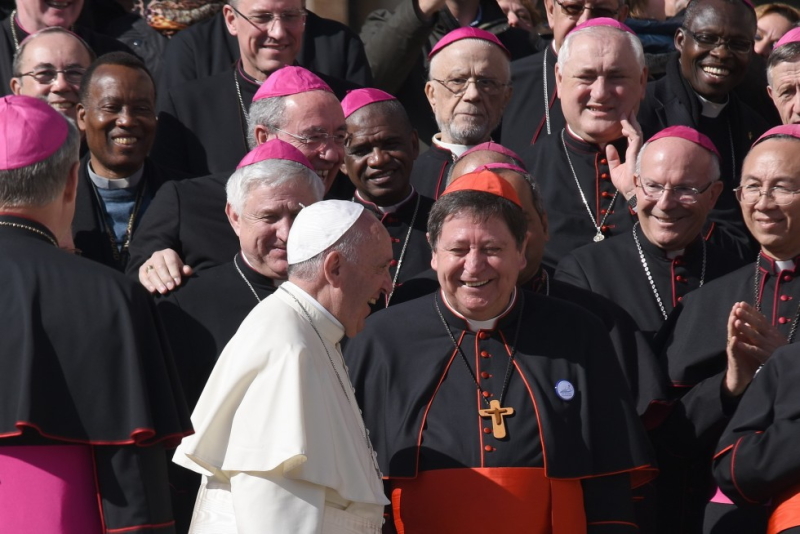 60 Bishop-friends of the Focolare Movement, representing 31 countries (Iraq, Lebanon, Syria, Bénin, Cameroon, Ivory Coast, Ethiopia, Madagascar, Democratic Rep.of Congo, Tanzania, Thailand, India, Pakistan, Brazil, Venezuela, Panama, U.S.A., Uruguay, Austria, Spain, France, Great Britain, Ireland, Italy, Portugal, Czech Rep., Latvia, the Rep.of Moldova, Romania, Ukraine, Hungary.), are presently gathered at Castelgandolfo (22-26 February). The participation at the General Audience held by Pope Francis at St. Peter’s Square has been the central point of this meeting. In his address the Pope urged the Bishops “to always keep alive the charism of unity in the apostolic ministry, in communion with the successor of Peter”. “A synodal Church is a Church that listens, that realizes that listening ‘is more than simply hearing’. It is a mutual listening in which everyone has something to learn.” This type of Church, as defined by the Pope during the ceremony commemorating the 50th anniversary of the institution of the Synod of Bishops, indicates the track to be followed during this conference. The choice of the title “A Church which generates unity” stems from the belief that, at a time marked by tensions and increasing disintegration, the people of God are called to contribute in a vital manner towards building relationships at all levels and in all environments. This has to be lived, first of all, within the Church itself and its source must be in the heart of a merciful God. The core of this theme lies in understanding Jesus’ prayer to the Father for unity (Jn 17), as “ gift, commitment and achievement”. Maria Voce, president of the Focolare Movement and Jesús Morán, co-president spoke about this approach in the light of Chiara Lubich’s charism.
60 Bishop-friends of the Focolare Movement, representing 31 countries (Iraq, Lebanon, Syria, Bénin, Cameroon, Ivory Coast, Ethiopia, Madagascar, Democratic Rep.of Congo, Tanzania, Thailand, India, Pakistan, Brazil, Venezuela, Panama, U.S.A., Uruguay, Austria, Spain, France, Great Britain, Ireland, Italy, Portugal, Czech Rep., Latvia, the Rep.of Moldova, Romania, Ukraine, Hungary.), are presently gathered at Castelgandolfo (22-26 February). The participation at the General Audience held by Pope Francis at St. Peter’s Square has been the central point of this meeting. In his address the Pope urged the Bishops “to always keep alive the charism of unity in the apostolic ministry, in communion with the successor of Peter”. “A synodal Church is a Church that listens, that realizes that listening ‘is more than simply hearing’. It is a mutual listening in which everyone has something to learn.” This type of Church, as defined by the Pope during the ceremony commemorating the 50th anniversary of the institution of the Synod of Bishops, indicates the track to be followed during this conference. The choice of the title “A Church which generates unity” stems from the belief that, at a time marked by tensions and increasing disintegration, the people of God are called to contribute in a vital manner towards building relationships at all levels and in all environments. This has to be lived, first of all, within the Church itself and its source must be in the heart of a merciful God. The core of this theme lies in understanding Jesus’ prayer to the Father for unity (Jn 17), as “ gift, commitment and achievement”. Maria Voce, president of the Focolare Movement and Jesús Morán, co-president spoke about this approach in the light of Chiara Lubich’s charism.

Cardinal Lorenzo Baldisseri
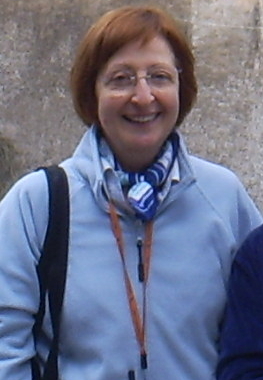
Feb 24, 2016 | Focolare Worldwide
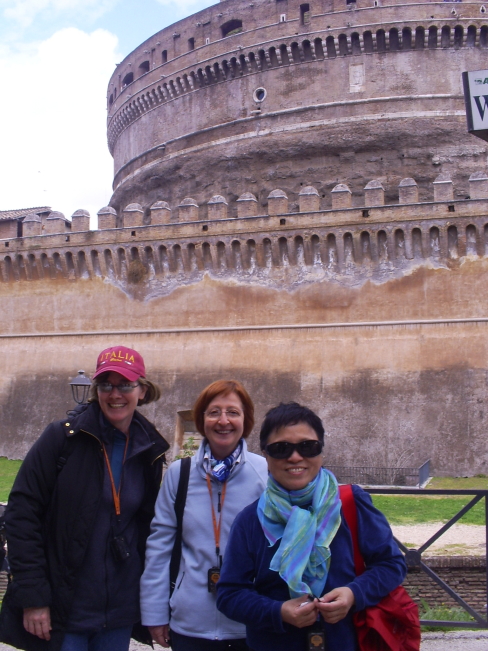
Maria Grazia Brusadelli (centre)
 At the moment, it is probably the most “extreme” periphery. Now Maria Grazia is preparing her documents for the move and visiting her relatives to inform them of her decision. She would still have time to change her mind, since the reports of new hostilities. A few days ago there was news of a bomb being detonated at a Doctors Without Borders hospital in Arat al Numan, leaving 8 dead and 40,000 people without medical care in an area of conflict. The killing of a young Caritas volunteer in Aleppo was also reported. Maria Grazia, what effect do these news reports have on you? Are you having any second thoughts? “Absolutely not. It’s true, each tragic news report is like an arrow to the heart. But I’m not afraid. Even though I’m well aware of the risks, I don’t fear for myself. I think of the people living there, and I already want to be with them to share their pain, to bring them – at least by being there, since I don’t speak Arabic – a little bit of hope. I’d like to already be there to make them feel the support and the nearness of Focolare members around the world who pray for them every day that peace will return to Syria. The Syrians with whom we are in contact are very grateful for this global participation and for all that’s being done on the ground to alleviate their hardship. I’d also like to already be there to bring them the love and hope of the Church. I’ll have the opportunity to meet with the Holy Father before going, and so I’ll be able to give them a message from him. In Damascus there are three women focolarini waiting for me, and the men focolarini in Aleppo. They live in close communion with the people in Syria who have embraced the spirituality of unity, and there’s the ecumenical and interreligious dialogue that’s very much alive among the locals. Because the Focolare – wherever it is in the world – has the spirit of a family, both among the members and with everyone else.”
At the moment, it is probably the most “extreme” periphery. Now Maria Grazia is preparing her documents for the move and visiting her relatives to inform them of her decision. She would still have time to change her mind, since the reports of new hostilities. A few days ago there was news of a bomb being detonated at a Doctors Without Borders hospital in Arat al Numan, leaving 8 dead and 40,000 people without medical care in an area of conflict. The killing of a young Caritas volunteer in Aleppo was also reported. Maria Grazia, what effect do these news reports have on you? Are you having any second thoughts? “Absolutely not. It’s true, each tragic news report is like an arrow to the heart. But I’m not afraid. Even though I’m well aware of the risks, I don’t fear for myself. I think of the people living there, and I already want to be with them to share their pain, to bring them – at least by being there, since I don’t speak Arabic – a little bit of hope. I’d like to already be there to make them feel the support and the nearness of Focolare members around the world who pray for them every day that peace will return to Syria. The Syrians with whom we are in contact are very grateful for this global participation and for all that’s being done on the ground to alleviate their hardship. I’d also like to already be there to bring them the love and hope of the Church. I’ll have the opportunity to meet with the Holy Father before going, and so I’ll be able to give them a message from him. In Damascus there are three women focolarini waiting for me, and the men focolarini in Aleppo. They live in close communion with the people in Syria who have embraced the spirituality of unity, and there’s the ecumenical and interreligious dialogue that’s very much alive among the locals. Because the Focolare – wherever it is in the world – has the spirit of a family, both among the members and with everyone else.”
Feb 23, 2016 | Non categorizzato
Chiara Lubich lived on this earth from January 22, 1920 until March 14, 2008. On the day she died thousands of people filled the streets of Rocca di Papa where the International Headquarters of the Focolare Movement is located as well as Chiara’s house. They were there to pay their final respects, and even larger crowds attended her funeral at the Basilica of St. Paul’s Outside the Walls. In the years that followed, her anniversary became an occasion to reflect on different aspects of the life, witness and thought of Chiara Lubich: ecumenical dialogue (Trent, 2012); the charism of unity and young people (2012); charism, history, culture (2013); interreligious dialogue (2014); politics for unity (2015). On January 27th of the same year there was the official opening of the Cause of Canonisation. In 2016 the focus will be on peace. Chiara Lubich was a peacemaker. She opened paths of dialogue at many levels and was internationally recognised, like when she was awarded the UNESCO Prize For Peace Education in 1996. Her spirituality, which also translates into the daily practice of universal brotherhood, has inspired hundreds of projects around the world that are aimed at enriching the world with humanity and solidarity through caring for Creation. These projects are all gathered in the United World Project (UWP). https://www.youtube.com/watch?v=TR_MvehHeIk While responding to Pope Francis’s appeal, on behalf of the Movement, Focolare president Maria Voce called for new commitment and effort in favour of peace. “We have to do more,” she said, to move the top politicians, the weapons trade networks and the chief strategists who – as we are beginning to see – can start off from the bottom with the mobilisation of civil society.” Maria Voce also called on the members of the Movement “to join in more with others” with others who are moving in this direction, to promote actions that unmask the causes of war and of the tragedies that afflict so many parts of the earth, with the goal of remedying them, “putting our own forces into play, our willingness and resources.” One event titled Culture of Dialogue, A Way To Build Peace, with a special appearance by the Gen Verde international band, will be held at Castel Gandolfo, Italy, on March 12th. These events will mark the 20th anniversary of the conferment of the UNESCO Prize For Peace Education to Chiara Lubich. The invitation is addressed to ambassadors to the Holy See, civil and Church leaders. Focolare president Maria Voce will give an address, which will be followed by several testimonies regarding dialogue as a way to build peace. On March 14th a Mass will be celebrated by Cardinal João Braz De Aviz at the Shrine of Our Lady of the Divine Love, while other events to remember Chiara are being held throughout the world.
Feb 23, 2016 | Non categorizzato
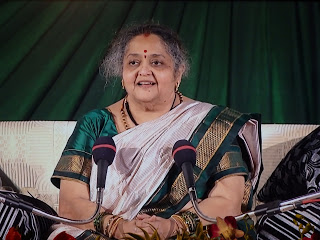
Feb 22, 2016 | Non categorizzato
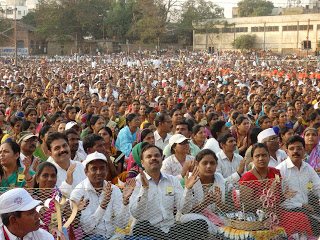 The city of Kolhapur hosted the meeting with some 50 thousand members and sympathisers of the Swadhyaya Movement which was founded by the Hindu reformer Pandurang Shastri Athawale and is currently guided by his daughter, Didi. A harmonious blend of ideals and intentions was born from the friendship between Didi and Chiara Lubich that grew over the years and continued with the election of Maria Voce Focolare president. Following the meetings between the women who succeeded the founders of those two movements, Maria Voce, Jesús Morán and the delegation from the Movement in Italy were invited to take part in the closing ceremony of a pilgrimage with some ten thousand couples from the Swadhyay Parivar Movement. The couples, who have been involved in the Hindu renewal movement, spent a week in contact with other families from the Kolhapur region sharing with them the ideals and spiritual life of their movement and paying a visit to the important temple of that region.
The city of Kolhapur hosted the meeting with some 50 thousand members and sympathisers of the Swadhyaya Movement which was founded by the Hindu reformer Pandurang Shastri Athawale and is currently guided by his daughter, Didi. A harmonious blend of ideals and intentions was born from the friendship between Didi and Chiara Lubich that grew over the years and continued with the election of Maria Voce Focolare president. Following the meetings between the women who succeeded the founders of those two movements, Maria Voce, Jesús Morán and the delegation from the Movement in Italy were invited to take part in the closing ceremony of a pilgrimage with some ten thousand couples from the Swadhyay Parivar Movement. The couples, who have been involved in the Hindu renewal movement, spent a week in contact with other families from the Kolhapur region sharing with them the ideals and spiritual life of their movement and paying a visit to the important temple of that region.  At the ceremony, which was held on a large plaza in the centre of the city, Didi Talwalkar told everyone about her friendship with Chiara Lubich, presenting Chiara as a Catholic leader and foundress of the Focolare Movement. Following a projection of photos showing the deep relationship between the two women, Maria Voce was asked to offer a greeting and the blessing of Chiara in the spirit of dialogue and shared membership in one human family as is written in the holy books of Hinduism like the vasudhavaiva kutumbakan. It was a very intense spiritual and emotional moment which strengthened the bond between the leaders of the two movements. The journey of these years has been a new experience of dialogue among the different relgions of India and Christians in the light of the spirituality of unity. It has been an experience of deep brotherhood at a living, but also intellectual level with valuable social projects. It continues to open paths of dialogue and knowledge of each other’s faith, in the light of the charism of Chiara Lubich, seen as a woman who knew how to read the signs of the times and who knew how to offer the world a spirit that could join everyone in a journey towards the Truth. The dialogue with Maria Voce and Jesús Morán during the February 13th telephone link-up ended with a question: “In the vast Hindu world where Christians are barely 2% of a population that exstends beyond one billion, what kind of impression does that leave you with? The Focolare president answered: “[It leaves me with the impression] of a small but alive Church, very alive.” “India is a large gift,” the co-president added. “They are very in favour of pluralism, and live it in an inclusive manner. They make space for each person to express their faith explicitly. This is a gift for the West, which lives pluralism in an almost excluding manner. Another thing is silence. Silence is necessary for every type of dialogue. Without interior and interpersonal silence, dialogue doesn’t have stand a chance.” Maria Voce concluded: “And this silence expresses the religious soul of the Indian people. As they said themselves: the gift that they can give the West is to make it rediscover the sense of God, sensing, feeling God.” See also: In India: a dialogue of hearts and minds
At the ceremony, which was held on a large plaza in the centre of the city, Didi Talwalkar told everyone about her friendship with Chiara Lubich, presenting Chiara as a Catholic leader and foundress of the Focolare Movement. Following a projection of photos showing the deep relationship between the two women, Maria Voce was asked to offer a greeting and the blessing of Chiara in the spirit of dialogue and shared membership in one human family as is written in the holy books of Hinduism like the vasudhavaiva kutumbakan. It was a very intense spiritual and emotional moment which strengthened the bond between the leaders of the two movements. The journey of these years has been a new experience of dialogue among the different relgions of India and Christians in the light of the spirituality of unity. It has been an experience of deep brotherhood at a living, but also intellectual level with valuable social projects. It continues to open paths of dialogue and knowledge of each other’s faith, in the light of the charism of Chiara Lubich, seen as a woman who knew how to read the signs of the times and who knew how to offer the world a spirit that could join everyone in a journey towards the Truth. The dialogue with Maria Voce and Jesús Morán during the February 13th telephone link-up ended with a question: “In the vast Hindu world where Christians are barely 2% of a population that exstends beyond one billion, what kind of impression does that leave you with? The Focolare president answered: “[It leaves me with the impression] of a small but alive Church, very alive.” “India is a large gift,” the co-president added. “They are very in favour of pluralism, and live it in an inclusive manner. They make space for each person to express their faith explicitly. This is a gift for the West, which lives pluralism in an almost excluding manner. Another thing is silence. Silence is necessary for every type of dialogue. Without interior and interpersonal silence, dialogue doesn’t have stand a chance.” Maria Voce concluded: “And this silence expresses the religious soul of the Indian people. As they said themselves: the gift that they can give the West is to make it rediscover the sense of God, sensing, feeling God.” See also: In India: a dialogue of hearts and minds
![Unity, the leaven of society]()
Feb 21, 2016 | Non categorizzato
 “The lines of John’s Gospel converge in the sentence which for quite some time has had deep and infinite meaning for me: ‘. . . may all be one. As you, Father, are in me and I am in you, may they also be in us, so that the world may believe that you have sent me’ (see Jn 17:21). This is how we are to live. [. . .] the Unity of the Church, the unity of those that find themselves beyond the confines of our Roman Catholic Church, the unity amongst all those who acknowledge faith in the one God, the Living One, and therefore with Jews and Muslims. That unity between Church and society in which the one does not find itself beside the other in a parallel sense or in an oppositional way, but Church and society enter into a reciprocal relationship, highlighting the fact that the unity which God gives is the leaven of society, the leaven that makes man free. It is the unity that makes us truly free, because we can only be ourselves in the fullest sense only where God has the right to be God in the fullest sense and therefore can give us everything He wishes to give us. And He doesn’t wish to give us anything less than His own interior mystery: Trinitarian unity. [. . .] But this is not a mere programme, because you never get very far with programmes. It must above all become life [. . .] I also have to begin to live this unity. And for this reason I trust in the fact that all of you, dear brothers and sisters, will help me, and that we can do this together, in reciprocity.” Bishop Klaus Hemmerle Source: W. Hagemann, Klaus Hemmerle innamorato della Parola di Dio, (Rome: Città Nuova, Rome, 2013) p. 337-338.
“The lines of John’s Gospel converge in the sentence which for quite some time has had deep and infinite meaning for me: ‘. . . may all be one. As you, Father, are in me and I am in you, may they also be in us, so that the world may believe that you have sent me’ (see Jn 17:21). This is how we are to live. [. . .] the Unity of the Church, the unity of those that find themselves beyond the confines of our Roman Catholic Church, the unity amongst all those who acknowledge faith in the one God, the Living One, and therefore with Jews and Muslims. That unity between Church and society in which the one does not find itself beside the other in a parallel sense or in an oppositional way, but Church and society enter into a reciprocal relationship, highlighting the fact that the unity which God gives is the leaven of society, the leaven that makes man free. It is the unity that makes us truly free, because we can only be ourselves in the fullest sense only where God has the right to be God in the fullest sense and therefore can give us everything He wishes to give us. And He doesn’t wish to give us anything less than His own interior mystery: Trinitarian unity. [. . .] But this is not a mere programme, because you never get very far with programmes. It must above all become life [. . .] I also have to begin to live this unity. And for this reason I trust in the fact that all of you, dear brothers and sisters, will help me, and that we can do this together, in reciprocity.” Bishop Klaus Hemmerle Source: W. Hagemann, Klaus Hemmerle innamorato della Parola di Dio, (Rome: Città Nuova, Rome, 2013) p. 337-338.
![Unity, the leaven of society]()
Feb 20, 2016 | Non categorizzato
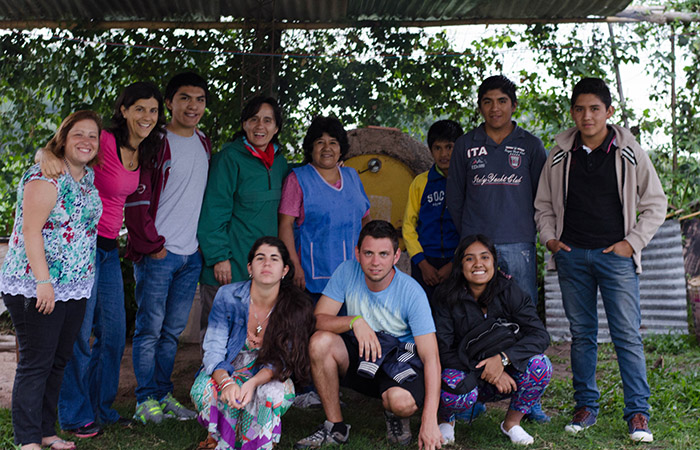 In El Espinal, a town in the province of Salta, Northern Argentina, 35 young people aged 18 to 30 from Argentina and Paraguay spent time together from 3 to 11 January, for a low-cost holiday but of “elevated levels of unity,” as they called it. In fact, also the Pastoral for Tourism –Programme for the Development of Solidal Tourism of that region also signed up for this project. This concerned firstly, living with the community and youth of the place, sharing their work in the tobacco fields with the beehive breeders and weavers, and also the typical difficulties of daily living in the countryside: cold water, lack of electricity, the mud that seems to seep through everywhere… The first point was: leaving behind commodities and prejudice. The Golden Rule “Do to others what you would like others to do to you” expressed in a nutshell what the youth of the Focolare wanted to fulfill in that community. But how were they supposed to accomplish it? It was first of all through an infinity of simple acts of love, and then with a cinema forum, meetings, an excursion, moments of relaxation, eating, dancing and singing together.… But the message was conveyed also through theatre plays that showed how El Espinal would be if everyone lived this simple rule. And who knows why this was so – perhaps for that reality “give and you shall be given” which always comes true – a competition of love triggered, where all gave their best. Maga recounts: “We will never forget how Pilar, a weaver, brought the best set of cutlery she had, to offer us a savoury soup, not to mention the ladies who set their chores aside to come and bake bread with us, and the enthusiasm of the boys and girls who fried doughnuts until late t night to make us feel at home. Then there were those who hosted us in their homes, giving us all they had to make us comfortable. There were so many new faces: and in each was Jesus who came towards us every time.” But the so-called holiday also had another objective, and this was to engage in a project to develop the Tourism Pastoral, which consisted in helping the population to see the touristic potential of their town. This was the main aim behind the organisation of activities that could later be transformed into concrete proposals for future visitors: trekking along the river, horseback riding, tractor excursions, and sight-seeing in the enchanting and hidden places of El Espinal.
In El Espinal, a town in the province of Salta, Northern Argentina, 35 young people aged 18 to 30 from Argentina and Paraguay spent time together from 3 to 11 January, for a low-cost holiday but of “elevated levels of unity,” as they called it. In fact, also the Pastoral for Tourism –Programme for the Development of Solidal Tourism of that region also signed up for this project. This concerned firstly, living with the community and youth of the place, sharing their work in the tobacco fields with the beehive breeders and weavers, and also the typical difficulties of daily living in the countryside: cold water, lack of electricity, the mud that seems to seep through everywhere… The first point was: leaving behind commodities and prejudice. The Golden Rule “Do to others what you would like others to do to you” expressed in a nutshell what the youth of the Focolare wanted to fulfill in that community. But how were they supposed to accomplish it? It was first of all through an infinity of simple acts of love, and then with a cinema forum, meetings, an excursion, moments of relaxation, eating, dancing and singing together.… But the message was conveyed also through theatre plays that showed how El Espinal would be if everyone lived this simple rule. And who knows why this was so – perhaps for that reality “give and you shall be given” which always comes true – a competition of love triggered, where all gave their best. Maga recounts: “We will never forget how Pilar, a weaver, brought the best set of cutlery she had, to offer us a savoury soup, not to mention the ladies who set their chores aside to come and bake bread with us, and the enthusiasm of the boys and girls who fried doughnuts until late t night to make us feel at home. Then there were those who hosted us in their homes, giving us all they had to make us comfortable. There were so many new faces: and in each was Jesus who came towards us every time.” But the so-called holiday also had another objective, and this was to engage in a project to develop the Tourism Pastoral, which consisted in helping the population to see the touristic potential of their town. This was the main aim behind the organisation of activities that could later be transformed into concrete proposals for future visitors: trekking along the river, horseback riding, tractor excursions, and sight-seeing in the enchanting and hidden places of El Espinal. 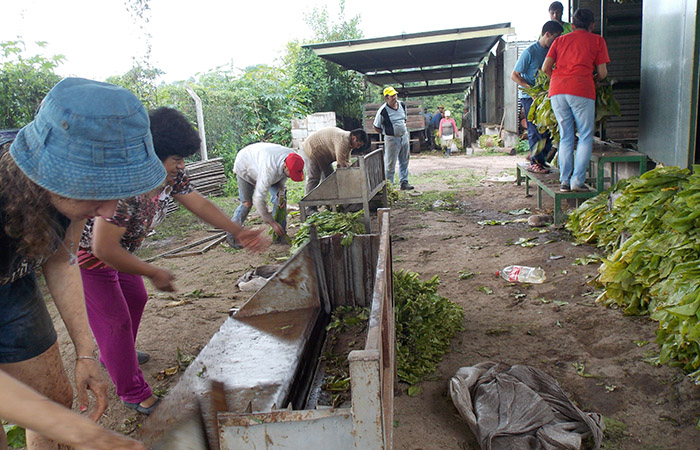 Among the breathtaking landscapes, sudden climate changes, the sun, animals and insects – at times not valued – everyone felt they could “feel God’s presence and the embrace of his creation” and also the relationships established among the youth, which were really enriching. In short, they spent a different type of holiday in the beautiful province of Salta, while adhering to Pope Francis’ invitation to live the Gospel in the outskirts. Before returning to their cities, they expressed their impressions: “I learnt a lot of things: to be happy with the little we have and not to complain, and live the golden rule. I felt loved and welcomed. All has left a deep mark in me. It was the best way to start the year. Thanks to you all, I have come closer to God.” Other impressions: “We shall leave with our hearts full of stories, experiences, their values, life, light and joy. I again discovered that if we live together for the others, everything else will come as an extra enrichment.” But also the local youth expressed themselves: “You are the best friends Jesus has given me.” “You have filled us with smiles, joy and peace.” Dominga wrote a prayer which she shared with us: “Thank you Jesus for being here and for giving me so many brothers as a gift. I discovered You in each one of them. Lord, teach us to dream big, and of beautiful things that expand our hearts.”
Among the breathtaking landscapes, sudden climate changes, the sun, animals and insects – at times not valued – everyone felt they could “feel God’s presence and the embrace of his creation” and also the relationships established among the youth, which were really enriching. In short, they spent a different type of holiday in the beautiful province of Salta, while adhering to Pope Francis’ invitation to live the Gospel in the outskirts. Before returning to their cities, they expressed their impressions: “I learnt a lot of things: to be happy with the little we have and not to complain, and live the golden rule. I felt loved and welcomed. All has left a deep mark in me. It was the best way to start the year. Thanks to you all, I have come closer to God.” Other impressions: “We shall leave with our hearts full of stories, experiences, their values, life, light and joy. I again discovered that if we live together for the others, everything else will come as an extra enrichment.” But also the local youth expressed themselves: “You are the best friends Jesus has given me.” “You have filled us with smiles, joy and peace.” Dominga wrote a prayer which she shared with us: “Thank you Jesus for being here and for giving me so many brothers as a gift. I discovered You in each one of them. Lord, teach us to dream big, and of beautiful things that expand our hearts.”
Feb 19, 2016 | Non categorizzato
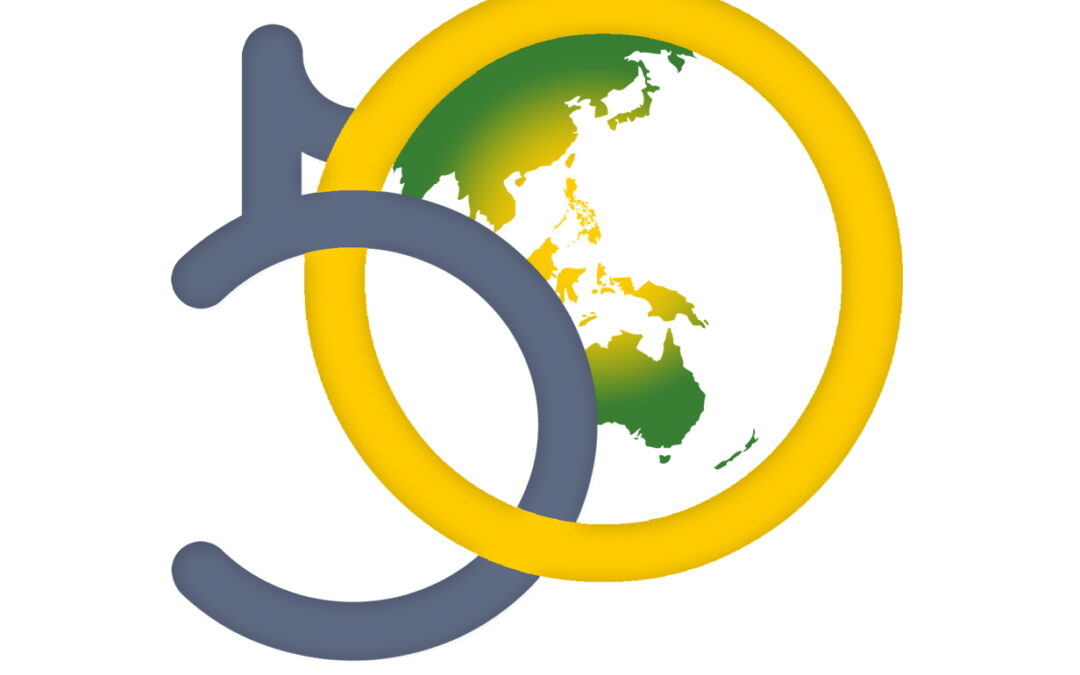
Feb 19, 2016 | Non categorizzato
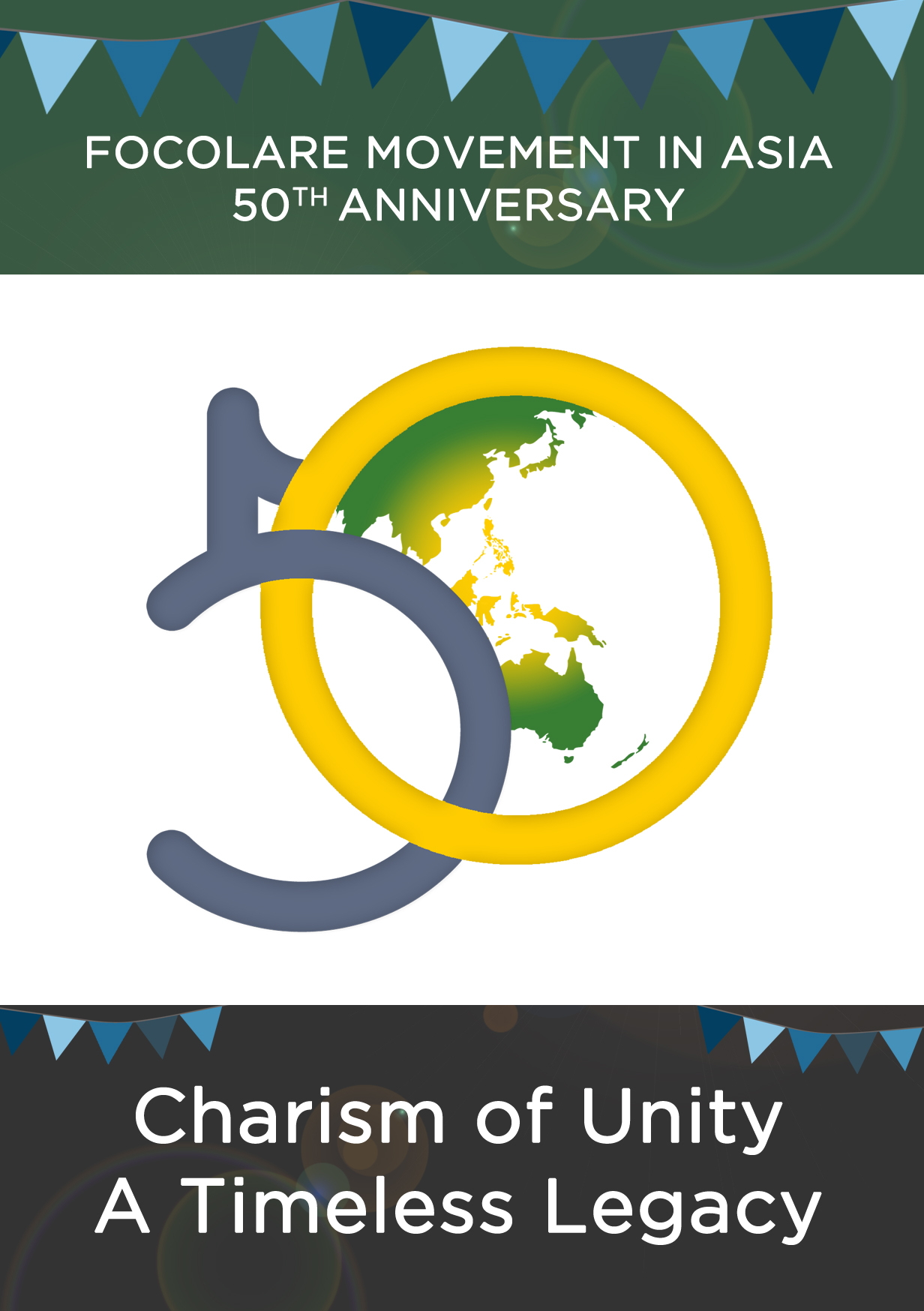

Feb 19, 2016 | Non categorizzato
Live streaming: http://www.ustream.tv/channel/feb-2013-celebration
 Fifty years ago, on February 22, 1966, a group of five men and women focolarini arrived in Manila. They were sent by Chiara Lubich in response to the request of Cardinal Rufino Santos, then Archbishop of Manila. Guido Mirti, Giovanna Vernuccio, Silvio Daneo, Ednara Tabosa and Magdalena Brandao were the first protagonists in the adventure of the Focolare in Asia. From Manila, they travelled to Japan, Korea, Hong Kong, Taiwan, India, Pakistan, Thailand, Cambodia, Vietnam … as far as Australia. The Focolare Movement spread widely throughout Asia fostering in all those who came into contact with it the spirit of unity that is its characteristic, in spite of the enormous diversity of cultures, religions and languages present in the region. “In 2016, we are planning a series of events to thank God for these fifty years of abundant graces, fruit of the meeting of the charism of unity,” write Ding Dalisay and Carlo Maria Gentile, from the Philippines. “On February 20 and 21, the whole family of Chiara present in this part of the world will gather together in Mariapolis Peace, in Tagaytay (Philippines). The first day will be ‘a homecoming’, back to our family; while on the second day, there will be a feast of thanksgiving, with artistic and cultural presentations, looking back at the story of these fifty years, to encourage us to go on, with new fervor, and continue offering our contribution towards the unity of the human family. On that occasion we will present the centers that have come up in the ‘little city’ Mariapolis Peace, at the service of the Movement throughout Asia: the School of the Oriental Religions (SOR), the Mariapolis Center, the Schools for the youth, the Centre for Priests, the House of the Seminarians, the Centers for Men Religious and for Women Religious, and the Bukas Palad and Pag-asa Social Centers. Several delegations are expected, from Korea, Japan, China, Indonesia, Thailand, Vietnam, Myanmar, India, Pakistan and Australia. Among the participants will be some among the first members of the Movement in the Philippines who have now permanently moved to the USA, thereby enriching the Focolare community in that country. The guests of honor will be the protagonists of those first times of the Focolare in Asia, who are now residing in Italy, Guatemala and Malta.” “On March 14, death anniversary of Chiara Lubich (January 22, 1920 – March 14, 2008),” continue Ding and Carlo Maria, “a Symposium will be held in Manila, on the theme: Charism of unity, a timeless legacy. This is especially intended for ecclesiastical and civil personalities so that together we may be able to reflect on the contribution that the charism of Chiara Lubich has given to the life of individuals, to communities, to the Church and society.” “In the various Mariapolis that will take place in the course of the year in the Philippines (in Davao, Cebu and Manila), they explain, one whole day will be dedicated to giving as many people as possible the opportunity to know the vitality that the spirituality of unity has brought to Asia in the fifty years of its presence here.” “Asia is also home to the great religions: Buddhism, Hinduism, Islam … For this reason, in 2017, in Thailand,” they conclude, “the 50th anniversary of the Focolare Movement will feature an interreligious event: it will be an invitation to all those who wish to join us in this walk towards the unity of the human family.”
Fifty years ago, on February 22, 1966, a group of five men and women focolarini arrived in Manila. They were sent by Chiara Lubich in response to the request of Cardinal Rufino Santos, then Archbishop of Manila. Guido Mirti, Giovanna Vernuccio, Silvio Daneo, Ednara Tabosa and Magdalena Brandao were the first protagonists in the adventure of the Focolare in Asia. From Manila, they travelled to Japan, Korea, Hong Kong, Taiwan, India, Pakistan, Thailand, Cambodia, Vietnam … as far as Australia. The Focolare Movement spread widely throughout Asia fostering in all those who came into contact with it the spirit of unity that is its characteristic, in spite of the enormous diversity of cultures, religions and languages present in the region. “In 2016, we are planning a series of events to thank God for these fifty years of abundant graces, fruit of the meeting of the charism of unity,” write Ding Dalisay and Carlo Maria Gentile, from the Philippines. “On February 20 and 21, the whole family of Chiara present in this part of the world will gather together in Mariapolis Peace, in Tagaytay (Philippines). The first day will be ‘a homecoming’, back to our family; while on the second day, there will be a feast of thanksgiving, with artistic and cultural presentations, looking back at the story of these fifty years, to encourage us to go on, with new fervor, and continue offering our contribution towards the unity of the human family. On that occasion we will present the centers that have come up in the ‘little city’ Mariapolis Peace, at the service of the Movement throughout Asia: the School of the Oriental Religions (SOR), the Mariapolis Center, the Schools for the youth, the Centre for Priests, the House of the Seminarians, the Centers for Men Religious and for Women Religious, and the Bukas Palad and Pag-asa Social Centers. Several delegations are expected, from Korea, Japan, China, Indonesia, Thailand, Vietnam, Myanmar, India, Pakistan and Australia. Among the participants will be some among the first members of the Movement in the Philippines who have now permanently moved to the USA, thereby enriching the Focolare community in that country. The guests of honor will be the protagonists of those first times of the Focolare in Asia, who are now residing in Italy, Guatemala and Malta.” “On March 14, death anniversary of Chiara Lubich (January 22, 1920 – March 14, 2008),” continue Ding and Carlo Maria, “a Symposium will be held in Manila, on the theme: Charism of unity, a timeless legacy. This is especially intended for ecclesiastical and civil personalities so that together we may be able to reflect on the contribution that the charism of Chiara Lubich has given to the life of individuals, to communities, to the Church and society.” “In the various Mariapolis that will take place in the course of the year in the Philippines (in Davao, Cebu and Manila), they explain, one whole day will be dedicated to giving as many people as possible the opportunity to know the vitality that the spirituality of unity has brought to Asia in the fifty years of its presence here.” “Asia is also home to the great religions: Buddhism, Hinduism, Islam … For this reason, in 2017, in Thailand,” they conclude, “the 50th anniversary of the Focolare Movement will feature an interreligious event: it will be an invitation to all those who wish to join us in this walk towards the unity of the human family.”

 60 Bishop-friends of the Focolare Movement, representing 31 countries (Iraq, Lebanon, Syria, Bénin, Cameroon, Ivory Coast, Ethiopia, Madagascar, Democratic Rep.of Congo, Tanzania, Thailand, India, Pakistan, Brazil, Venezuela, Panama, U.S.A., Uruguay, Austria, Spain, France, Great Britain, Ireland, Italy, Portugal, Czech Rep., Latvia, the Rep.of Moldova, Romania, Ukraine, Hungary.), are presently gathered at Castelgandolfo (22-26 February). The participation at the General Audience held by Pope Francis at St. Peter’s Square has been the central point of this meeting. In his address the Pope urged the Bishops “to always keep alive the charism of unity in the apostolic ministry, in communion with the successor of Peter”. “A synodal Church is a Church that listens, that realizes that listening ‘is more than simply hearing’. It is a mutual listening in which everyone has something to learn.” This type of Church, as defined by the Pope during the ceremony commemorating the 50th anniversary of the institution of the Synod of Bishops, indicates the track to be followed during this conference. The choice of the title “A Church which generates unity” stems from the belief that, at a time marked by tensions and increasing disintegration, the people of God are called to contribute in a vital manner towards building relationships at all levels and in all environments. This has to be lived, first of all, within the Church itself and its source must be in the heart of a merciful God. The core of this theme lies in understanding Jesus’ prayer to the Father for unity (Jn 17), as “ gift, commitment and achievement”. Maria Voce, president of the Focolare Movement and Jesús Morán, co-president spoke about this approach in the light of Chiara Lubich’s charism.
60 Bishop-friends of the Focolare Movement, representing 31 countries (Iraq, Lebanon, Syria, Bénin, Cameroon, Ivory Coast, Ethiopia, Madagascar, Democratic Rep.of Congo, Tanzania, Thailand, India, Pakistan, Brazil, Venezuela, Panama, U.S.A., Uruguay, Austria, Spain, France, Great Britain, Ireland, Italy, Portugal, Czech Rep., Latvia, the Rep.of Moldova, Romania, Ukraine, Hungary.), are presently gathered at Castelgandolfo (22-26 February). The participation at the General Audience held by Pope Francis at St. Peter’s Square has been the central point of this meeting. In his address the Pope urged the Bishops “to always keep alive the charism of unity in the apostolic ministry, in communion with the successor of Peter”. “A synodal Church is a Church that listens, that realizes that listening ‘is more than simply hearing’. It is a mutual listening in which everyone has something to learn.” This type of Church, as defined by the Pope during the ceremony commemorating the 50th anniversary of the institution of the Synod of Bishops, indicates the track to be followed during this conference. The choice of the title “A Church which generates unity” stems from the belief that, at a time marked by tensions and increasing disintegration, the people of God are called to contribute in a vital manner towards building relationships at all levels and in all environments. This has to be lived, first of all, within the Church itself and its source must be in the heart of a merciful God. The core of this theme lies in understanding Jesus’ prayer to the Father for unity (Jn 17), as “ gift, commitment and achievement”. Maria Voce, president of the Focolare Movement and Jesús Morán, co-president spoke about this approach in the light of Chiara Lubich’s charism. 



 The city of Kolhapur hosted the meeting with some 50 thousand members and sympathisers of the
The city of Kolhapur hosted the meeting with some 50 thousand members and sympathisers of the  “The lines of John’s Gospel converge in the sentence which for quite some time has had deep and infinite meaning for me: ‘. . . may all be one. As you, Father, are in me and I am in you, may they also be in us, so that the world may believe that you have sent me’ (see Jn 17:21). This is how we are to live. [. . .] the Unity of the Church, the unity of those that find themselves beyond the confines of our Roman Catholic Church, the unity amongst all those who acknowledge faith in the one God, the Living One, and therefore with Jews and Muslims. That unity between Church and society in which the one does not find itself beside the other in a parallel sense or in an oppositional way, but Church and society enter into a reciprocal relationship, highlighting the fact that the unity which God gives is the leaven of society, the leaven that makes man free. It is the unity that makes us truly free, because we can only be ourselves in the fullest sense only where God has the right to be God in the fullest sense and therefore can give us everything He wishes to give us. And He doesn’t wish to give us anything less than His own interior mystery: Trinitarian unity. [. . .] But this is not a mere programme, because you never get very far with programmes. It must above all become life [. . .] I also have to begin to live this unity. And for this reason I trust in the fact that all of you, dear brothers and sisters, will help me, and that we can do this together, in reciprocity.”
“The lines of John’s Gospel converge in the sentence which for quite some time has had deep and infinite meaning for me: ‘. . . may all be one. As you, Father, are in me and I am in you, may they also be in us, so that the world may believe that you have sent me’ (see Jn 17:21). This is how we are to live. [. . .] the Unity of the Church, the unity of those that find themselves beyond the confines of our Roman Catholic Church, the unity amongst all those who acknowledge faith in the one God, the Living One, and therefore with Jews and Muslims. That unity between Church and society in which the one does not find itself beside the other in a parallel sense or in an oppositional way, but Church and society enter into a reciprocal relationship, highlighting the fact that the unity which God gives is the leaven of society, the leaven that makes man free. It is the unity that makes us truly free, because we can only be ourselves in the fullest sense only where God has the right to be God in the fullest sense and therefore can give us everything He wishes to give us. And He doesn’t wish to give us anything less than His own interior mystery: Trinitarian unity. [. . .] But this is not a mere programme, because you never get very far with programmes. It must above all become life [. . .] I also have to begin to live this unity. And for this reason I trust in the fact that all of you, dear brothers and sisters, will help me, and that we can do this together, in reciprocity.”  In El Espinal, a town in the province of Salta, Northern Argentina, 35 young people aged 18 to 30 from Argentina and Paraguay spent time together from 3 to 11 January, for a low-cost holiday but of “elevated levels of unity,” as they called it. In fact, also the
In El Espinal, a town in the province of Salta, Northern Argentina, 35 young people aged 18 to 30 from Argentina and Paraguay spent time together from 3 to 11 January, for a low-cost holiday but of “elevated levels of unity,” as they called it. In fact, also the  Among the breathtaking landscapes, sudden climate changes, the sun, animals and insects – at times not valued – everyone felt they could “feel God’s presence and the embrace of his creation” and also the relationships established among the youth, which were really enriching. In short, they spent a different type of holiday in the beautiful province of Salta, while adhering to Pope Francis’ invitation to live the Gospel in the outskirts. Before returning to their cities, they expressed their impressions: “I learnt a lot of things: to be happy with the little we have and not to complain, and live the golden rule. I felt loved and welcomed. All has left a deep mark in me. It was the best way to start the year. Thanks to you all, I have come closer to God.” Other impressions: “We shall leave with our hearts full of stories, experiences, their values, life, light and joy. I again discovered that if we live together for the others, everything else will come as an extra enrichment.” But also the local youth expressed themselves: “You are the best friends Jesus has given me.” “You have filled us with smiles, joy and peace.” Dominga wrote a prayer which she shared with us: “Thank you Jesus for being here and for giving me so many brothers as a gift. I discovered You in each one of them. Lord, teach us to dream big, and of beautiful things that expand our hearts.”
Among the breathtaking landscapes, sudden climate changes, the sun, animals and insects – at times not valued – everyone felt they could “feel God’s presence and the embrace of his creation” and also the relationships established among the youth, which were really enriching. In short, they spent a different type of holiday in the beautiful province of Salta, while adhering to Pope Francis’ invitation to live the Gospel in the outskirts. Before returning to their cities, they expressed their impressions: “I learnt a lot of things: to be happy with the little we have and not to complain, and live the golden rule. I felt loved and welcomed. All has left a deep mark in me. It was the best way to start the year. Thanks to you all, I have come closer to God.” Other impressions: “We shall leave with our hearts full of stories, experiences, their values, life, light and joy. I again discovered that if we live together for the others, everything else will come as an extra enrichment.” But also the local youth expressed themselves: “You are the best friends Jesus has given me.” “You have filled us with smiles, joy and peace.” Dominga wrote a prayer which she shared with us: “Thank you Jesus for being here and for giving me so many brothers as a gift. I discovered You in each one of them. Lord, teach us to dream big, and of beautiful things that expand our hearts.”
